Reviews
Stanley Kubrick
UK, 1975
Credits
Review by David Carter
Posted on 11 March 2010
Source Warner Bros. DVD
Categories Kubrick
Kubrick’s Barry Lyndon has the unfortunate position of following 2001: A Space Odyssey and A Clockwork Orange, two of his most critically praised and commercially successful films. Barry Lyndon received a much cooler welcome than those two and, despite faring well at the Academy Awards, critics and audiences felt the film fell short of the mark. Pauline Kael assessed the film as “monumentally unimaginative” at its release but critical opinion of the film has shifted, slowly but surely, as it made an appearance on Time’ s “Best Films of the 1970s” list and was later called “Kubrick’s neglected masterpiece” by the Daily Telegraph in 2009. The film remains one of his least examined or celebrated works, despite the shift in opinion. Though it is a masterpiece on par with his other films, Barry Lyndon’s less esteemed place in Kubrick’s oeuvre may be due to the fact that it represents such a stark departure from those films closest to it.
Perhaps it is all just a case of bad timing. This would be quite fitting as Barry Lyndon concerns a man plagued by bad timing and rotten luck. It is also the story of a young man with good intentions and high moral character, and the essence of the narrative is an examination of how he is robbed of both by a society that cares little for such virtues. The film’s initial scenes depict the father of young Redmond Barry — the titular character’s birth name — being killed in a duel, setting the tone for the catalog of misfortunes that will befall Barry throughout the course of the film. The narrator describes the circumstances of the duel with exaggerated pauses so the count can be heard, only giving the matter of contention (horses) at the very end as if the punch line to a very dark joke. He gives these and other details about Barry’s life in a glibly derisive tone throughout, his words always informed by the tragic end he knows Barry will meet.
This first tragedy is, of course, no fault of Barry’s doing, but a main facet of the remainder of Barry Lyndon is this question of responsibility. Indeed, leading the audience to a decision about the responsibility of Barry’s misfortune is Kubrick’s main goal for the film. Contrary to the position taken frequently by the narrator, Kubrick consistently makes the case that Barry’s troubles come from external sources rather than through a fault of his own character. This conclusion may not be immediately evident from a superficial examination of the film. Barry is a rogue and will garner little sympathy from most viewers—the easiest viewpoint to take is that he has no one to blame but himself. But a deeper analysis reveals Kubrick’s true motives. Barry Lyndon contains subtle critiques of British manners, aristocracy and empire—the defining characteristics of 18^th^ century England. Kubrick’s goal is to show the hollowness beneath the gilded veneer typically found in period dramas.
After his father’s death, Barry grows to be a polite but painfully naïve young man, knowing nothing of the world outside of the small hamlet where he lives. When his older cousin, Nora, seduces him, Barry trembles with fear at her touch, falling deeply in love with the girl. At this point in the narrative, Barry is a blank slate—his closest cinematic kin would be Chauncey Gardner from Being There. He is clay to be molded by the world and Nora’s seduction gives us our first glimpse of a naïveté to be exploited by those around him. In this natural state, Barry is morally pure, knowing only love for his mother, his family, and Nora. The outside world soon arrives on Barry’s doorstep in the form of a British regiment, setting off a chain of events by which the pure Barry would become remolded in the world’s wicked image.
Nora leaves Barry for a wealthy British officer, but while it is Nora that breaks his heart, the British Empire has effectively stolen his innocence. Barry later finds himself a soldier in both the British and Prussian armies, quickly becoming what the narrator calls, “very far advanced in the science of every kind of misconduct.” Kubrick was later accused of glorifying war in Full Metal Jacket by Pickup on South Street director Samuel Fuller1, but Barry Lyndon presents a decidedly dim view of the institution. The armies in Barry Lyndon are filled with villains and crooks, and Barry has more to fear from his fellow soldiers than from the faceless enemies across the battlefield. It is in the army that the once-noble Barry becomes a liar and a thief, and it is in this stark contrast that we can see Kubrick’s critique of war, how it rewards vice and corrupts all who participate. Barry, who had only found sorrow while being virtuous, uses his newfound talent for wrongdoing in his post-war career as a conman and gambler.
Having been transformed from “noble savage” to well-mannered villain, Barry Lyndon’s second half concerns his attempt to become a part of polite society—to “rise above his station,” in the words of the narrator. Redmond Barry rogue, becomes Barry Lyndon, man of money and property, by marrying the pious Countess Lyndon. Kubrick immediately equates the aristocracy with façade: the extremely religious Countess begins her affair with Barry while her husband is still alive. Kubrick shows us that the mannered world of the aristocracy is filled with deceit and greed, and the fact that Barry fails to succeed in this world is one of the film’s harshest attacks on that society. Barry, a trained conman and former career criminal, finds himself consistently outmatched by his new peers. They are simply shrewder, more cunning than he. Barry has traded one company of criminals (the army) for another (high society), but while the army’s thieves and cutthroats welcome him as a brother, his aristocratic peers refuse to accept a newcomer into their ranks and begin working feverishly to displace him.
Barry’s change of station functions on two very distinct levels, the first of which is the literal rise in station through his marriage to a member of the aristocracy. His experience mirrors that of his homeland as well though. Barry’s native Ireland was in an ambiguous position during the period in which the film is set. Not a part of Great Britain yet or a sovereign nation, Ireland – like Barry – lacked an official status in Europe, politically or socially. Therefore Barry is separated from Great Britain’s aristocracy both economically and politically and Barry’s “social climbing” that the narrator so frequently derides can be seen in a more positive light as a struggle for political enfranchisement. This adds another layer — one of national prejudice — to the resistance Barry faces while trying to integrate into high society.
Kubrick’s subversion of period drama conventions can be seen as a critique on the genre. To that end, he makes Lord Bullingdon the film’s main villain. Bullingdon is the type of character that would typically be the hero in such a film. He sees his family fortune effectively stolen by a usurper (Barry) who tyrannically menaces him and breaks his mother’s heart. He is shown to be a coward, however, lacking in the basic human civility that Barry retains even at his most debauched. Barry spares Bullingdon’s life even though he knows that he wishes to kill him. Bullingdon, who frequently references Barry’s Irish heritage in his insults, doesn’t offer Barry the same courtesy and serves as a representative of the aristocracy—unforgiving, prejudiced, cruel, and concerned only with a system of manners rather than with any higher moral law.
Kubrick is relentless in his critiques of England, the nation, but takes the opposite approach to depicting England, the country. The film contains some of his most beautiful camerawork and his lens lovingly captures the majesty of the Irish countryside in which it was filmed. A frequent technique is to begin a scene in close up and then slowly pan out to reveal a vibrant tableau of nature. Barry Lyndon is simultaneously grander in scope and more intimate than Kubrick’s previous films, and he took much of his inspiration from paintings for both interior and exterior scenes. Using specially designed Zeiss lenses, much of the film was shot using only natural lighting or, in some cases, candlelight. Kubrick’s use of light and shadow creates a highly realistic world, one that seems less removed from the modern day than in other such films.
Almost as if in opposition to the facets of the film I’ve outlined above, Kubrick imbued Barry Lyndon with a rigid formalism. There is a very conscious attempt not to break with the constraints of the period piece format. The narrator constantly reminds us of Barry’s every misstep, taking great joy in pointing out the folly of his undertaking. Why then do I maintain that Kubrick had something in mind other than what the film constantly reiterates visually and narratively?
I see Kubrick’s main technique in the film to be irony. Barry Lyndon is brimming with irony on every level, from the internal machinations of the film to its external reception, and it is Kubrick’s intent to show the audience the darkly comic way in which all aspects of life are contradictory. Let us reexamine the opening scene for the first such example. The narrator makes it a point that Barry’s father is “trained in law” while at the same time showing him preparing for a duel, an illegal activity. The narrator’s words are not pointing out that Barry’s father is ignorant of the law or too hot-tempered to avoid breaking it, but rather that there is a pervasive duplicity in society. The film uses three instances of dueling – an uncivilized act performed in a formalized, civil way – as a metaphor for Kubrick’s explorations of the hypocrisies of war and the aristocracy.
The beauty of Kubrick’s cinematography is also ironic. He is actively working to make a beautiful film about the ugliness of life, thus the preoccupation with battle scenes in the film’s first half. His dedication to rigidly adhering to the style of the period film is an attempt to use the form as a weapon against itself. The beauty of a scene like the outdoor conversation between Barry and his mother is a prime example of Kubrick’s ironic cinematography. A spectacular tracking shot follows Barry’s family parting the blue water in a small boat, and then travels up and along a moss-covered bridge before ending on a tight shot of the two speakers against a backdrop of lush greens. Their topic of discussion? How Barry can secure a title for himself through less than honorable means. The ironic juxtaposition of pastoral beauty and moral corruptness is Kubrick’s motivation to make the film as beautiful and formal as possible because it is within the contrast that the latter of the two concepts in the scene is best shown.
Even the film’s champions criticize the casting of Ryan O’Neal in the title role. I find it to be fitting in with the film’s themes and Kubrick’s use of irony, however. On the first level, O’Neal is outmatched by the script and the demands placed upon him by it. There is a definite connection between O’Neal’s shortcomings and those of the character he plays. Barry Lyndon is a failure but one with good intentions and the same could be said of O’Neal. Since Kubrick would have had his pick of actors from around the world, the assumption must be made that he had a goal in mind.
O’Neal’s performance is a successful one on a certain level. His acting style is very natural, which is in direct contrast of the formal, almost campy (but very much in line with period drama conventions) performances of his co-stars. Again, this leads to the conclusion that Kubrick cast him ironically, to heighten the degree to which the artificialness of the other performances could be seen. The presence of O’Neal aids Kubrick in his subversion of the genre. In every carefully composed scene, O’Neal draws the viewer out of the artificial reality of the film, bringing them back to the reality necessary for Kubrick to comment on the period.
Barry Lyndon is one of Kubrick’s best films and it is also one of his most misunderstood. The severity of Kubrick’s criticisms is matched only by the subtlety with which he employs them. It is therefore easy to see how audiences and critics of the day confused the film with a typical period drama. When viewing Barry Lyndon as such, it admittedly falls flat. It is lethargically paced and often appears to be little more than a vehicle to display period costumes, music and set pieces. Kubrick purposefully obscures his anti-establishment and anti-war messages through his use of irony and Barry’s admittedly unlikeable persona, allowing the film to maintain the guise of a typical period costume drama while skewering the virtues such films typically celebrate.
- “I’ll never forget the experience I had escorting the late Samuel Fuller, the much-decorated World War II hero and maverick filmmaker, to a multiplex screening of Full Metal Jacket, along with fellow critic Bill Krohn, in Santa Barbara 13 years ago. Though Fuller courteously stayed with us to the end, he declared afterward that as far as he was concerned, it was another goddamn recruiting film—that teenage boys who went to see Kubrick’s picture with their girlfriends would come out thinking that wartime combat was neat.” – Jonathon Rosenbaum, Movie Wars, Chicago Review Press, 2002↩
More Kubrick
-
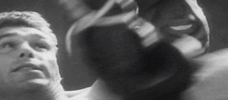
Stanley Kubrick’s Early Documentaries
1951-53 -

Fear and Desire
1953 -

Killer’s Kiss
1955 -
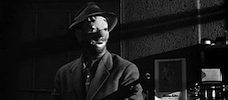
The Killing
1956 -
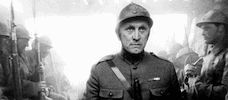
Paths of Glory
1957 -
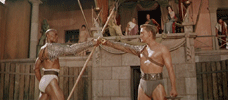
Spartacus
1960 -

Lolita
1962 -
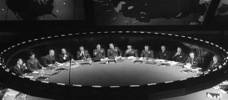
Dr. Strangelove or: How I Learned to Stop Worrying and Love the Bomb
1964 -

2001: A Space Odyssey
1968 -

A Clockwork Orange
1971 -
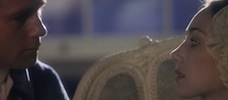
Barry Lyndon
1975 -
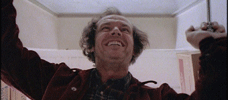
The Shining
1980 -

Full Metal Jacket
1987 -
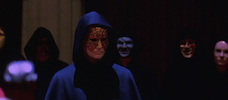
Eyes Wide Shut
1999 -

A.I.
2001
We don’t do comments anymore, but you may contact us here or find us on Twitter or Facebook.



